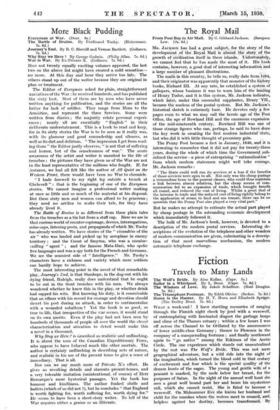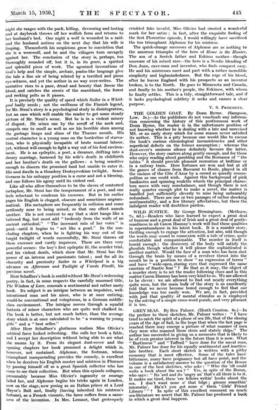Fiction
Travels to Many Lands
The Wolf's Bride. By Aino Kailas. (Cape. 5s.) Sailor in a Whirlpool. By L. Steni. (Cape. 7s. 6d.) Wirier a week-end ! I have startling memories of ranging through the Finnish night cheek by-jowl with a werewolf, of contemplating with fascinated disgust the garbage heaps and slime of the Thames estuary ; within a few hours I was off across the Channel to be titillated by the amorousness of lower middle-class Germany ; thence to Florence in the company of a masquerading footman ; and finally northward again to " go native " among the Eskimos of the Arctic Circle. The one experience which stands out unneutralized by the rest was The Wolfs Bride. -This was not mere geographical adventure, but a wild ride into the night of the imagination, which turned the blood cold in that ecstasy of excitement and fear which is the special quality of the demon hunts of the sagas. The young and gentle wife of a peasant is marked, by the mole below her breast, for the purposes of Satan. In the night of the annual wolf hunt she sees a great wolf bound past her and hears his mysterious call, which she cannot resist. She is fated to become a werewolf. On *Midsunimer EYe she leaves her husband and child for the marshes where the wolves meet in council, and, helpless against her destiny, becomes transformed. By
night she ranges with the pack, killing, devouring and lusting and at daybreak throws off her wolfish form and returns to her husband's bed. One night a wolf is wounded in a raid, and the husband notices on the next day that his wife is limping. Thenceforth his suspicions grow to conviction that she is a werewolf, and he and the villagers turn savagely against her. The conclusion of the story is, perhaps, too thoroughly rounded off, but it is, in its genre, a spirited and splendid piece of work. The agonized invocations of God's help and the simple, archaic, psalm-like language give the tale a fine air of being related by a terrified and pious eye-witness, and yet the author in no way over-writes. The narrative rises to a pace, dread and beauty that freeze the blood, and catches the scents of the marshland, the forest and reeking pelts as it passes.
It is precisely the quality of speed which Sailor in a Whirl- pool badly needs ; not the swiftness of the Finnish legend, for Mr. Steni's story is a psychological study in disintegration, but an ease which will enable the reader to get some steady picture of Mr. Steni's scene. But he is in a violent misery of disgust. He seizes one by 'the scruff of the neck and, compels one to smell as well as see his horrible slum among the garbage heaps and slime of the Thames mouth. His central character is a young man on the borderline of starva- tion, who is physically incapable of brute manual labour, yet, without will enough to fight a way out of his foul environ- ment. He is an epileptic, a poet, a dreamer, drifting into a dreary marriage, harassed by his wife's death in childbirth and her brother's death on the gallows : a being sensitive enough to discern the promised land but unable to enter it. His soul dwells in a thundery Dostoyevskian twilight. Sensi- tiveness in his unhappy position is a curse and not a blessing, and one follows his agony until its violent end.
Like all who allow themselves to be the slaves of contorted metaphor, Mr. Steni has the temperament of a poet, and one feels reluctant to condemn his excesses. But in his earlier pages his English is clogged, obscure and sometimes ungram- matical. . His metaphors are frequently in collision and come perilously near to being mixed, so that one effect annuls another. He is not content to say that a skirt hangs like a tattered flag, but must add " brokenly from the walls of an ancient cathedral." " The incessant rain of her voice " is good—until it begins to " act like a goad." In the con- cluding chapters, when he is fighting his way out of the turgid twilight of words successfully, Mr. Steni throws off these excesses and vastly improves. There are three very powerful scenes: the boy's first epileptic fit, the murder trial, and his violent death, which show that Mr. Steni has the power of an intense and passionate talent ; and for all its obscurity and preciosity Sailor in a Whirlpool is a big advance on Afternoon and Twilight of Vanda Pinelli, his previous novel.
Herr Schaffner's book is sordid without Mr.Steni's redeeming poetry, in fact, in some respects the carefully smarmed title, The Wisdom of Love, conceals a sentimental and rather nasty book. Its subject is an intrigue between an impulsive, well- intentioned man and his niece, who is at once enticing, would-be conventional and voluptuous, in a German middle= class environment. The intrigue moves through a squalid fantasia of minor characters who are quite well chalked in.
The book is better, but not much better, than the average story which is at once calculated to be " a warning to young girls " and a " best seller."
After Herr Schaffner's glutinous realism Miss Olivier's satirical faree looked refreshing. She calls her book a fable, and I accept her description without being able to see what she means _ by it. From its elegant dust-cover and the opening chapters her book promised a delight which is, however, not sustained. Alphonse, the footman, whose triumphant masquerading provides the comedy, is excellent when he deceives his English master and mistress in Florence by passing himself off as a great Spanish collector who has come to see their collection. But when this episode collapses, Presumably because Miss Olivier's ingenuity or courage failed her, and Alphonse begins his tricks again in London, now on the stage, now posing as an Italian prince at a Lord Mayor's Ball and, finally (having inherited his mistress's fortune), as a French vicomte, the farce suffers from a same- ness of the invention. In Mrs. Lemaur, that grotesquely crinkled fake invalid, Miss Olivier had created a wonderful mark for her satire ; in fact, after the exquisite fooling of the first Florentine episode, I would willingly have sacrificed the too triumphant Alphonse for his mistress.
The quick-change successes of Alphonse are as nothing to the amorous triumphs of the hero of Home is the Hunter. The son of a Scotch father and Eskimo mother—though unaware of his mixed race—the hero is a Nordic blending of Don Juan, cave-man and inventor, who finds conquest easy. He and his mistresses meet and part with a rather incredible simplicity and highmindedness. But the urge of his blood, after he leaves England with his prospects as an inventor broken, is to the North. He goes to Minnesota and Canada, and finally to his mother's people, the Eskimos, with whom he finally settles. This is a tidy, straightforward tale, and if it lacks psychological subtlety it seeks and ensues a clear purpose.
V. S. PRITCHETT.





















































 Previous page
Previous page